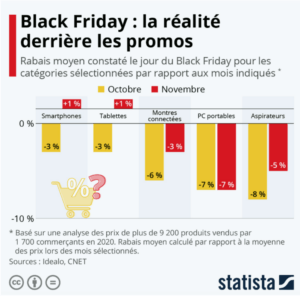[vc_row][vc_column][vc_column_text]
For nearly 10 years now, France has been the place to be: Black Friday. Black Friday.
Whether you're a fan of the concept or strongly against it, you'd have to live in a cave not to see the ads announcing or denouncing this commercial operation.
Imported into Europe only a decade ago, it's now ringing in the festive season just as it did in the USA, where it originated.
[/vc_column_text][vc_column_text]
The origins of Black Friday
[/vc_column_text][vc_row_inner equal_height=”yes” content_placement=”middle” gap=”10″ css=”.vc_custom_1669221726258{margin-bottom: 15px !important;}”][vc_column_inner width=”1/3″ css=”.vc_custom_1669221188288{padding-left: 15px !important;background-image: url(https://www.universretail.com/wp-content/uploads/2022/11/cardmapr-nl-pwxESDWRwDE-unsplash-1.jpg?id=17370) !important;background-position: center !important;background-repeat: no-repeat !important;background-size: cover !important;}”][/vc_column_inner][vc_column_inner width=”2/3″][vc_column_text]
Birth in the United States
In America, the term Black Friday first appeared in a newspaper article in 1951. At the time, it referred to the start of a long weekend 3-day weekend for employees, causing endless traffic jams on the roads.
A few years later, day-after-Thanksgiving shopping brought businesses out of the red. out of the red and write the new positive figures in black in the ledger.
[/vc_column_text][/vc_column_inner][/vc_row_inner][vc_row_inner][vc_column_inner][vc_column_text]
It was in the 70s that American retailers decided to adopt this expression to designate the start of Christmas shopping.
This event spread beyond the continent, arriving in Europe in the 2010s.
Black Friday in France
In France, this concept is taking off mainly thanks to the internet. This is a French particularityIn the United States, the big promotions take place in stores. Black Friday got off to a timid start in France in 2013, taking off in 2016.
Since 2017, there has been a opposition movement Black Friday to combat overconsumption. In 2019, the movement is gaining momentum with the convergence of associations such as ANV-COP 21, Extinction Rebellion and Youth for Climate. There are even blockades of certain companies' warehouses, such as Amazon.
This doesn't seem to have dampened the buying frenzy of consumers, who flock to so-called bargains.
[/vc_column_text][/vc_column_inner][/vc_row_inner][/vc_column][/vc_row][vc_row][vc_column][vc_column_text]
Is Black Friday really worthwhile for consumers?

On the consumer side
Not so sure, if the figures are anything to go by:
- 95% of products on sale during Black Friday 2018 were cheaper or the same price after the day's sales
- 61% of products were even cheaper before Black Friday.
According to a Kantar study carried out for the Idealo comparison site, this depends on the product families. For technical and lifestyle products, Black Friday is the most interesting week.
[/vc_column_text][vc_column_text][/vc_column_text][vc_row_inner equal_height=”yes” content_placement=”middle” css=”.vc_custom_1669221736756{margin-bottom: 15px !important;}”][vc_column_inner width=”1/3″ css=”.vc_custom_1669221671010{padding-left: 15px !important;background-image: url(https://www.universretail.com/wp-content/uploads/2022/11/wicked-monday-jxhM5Ni46zw-unsplash.jpg?id=17380) !important;background-position: center !important;background-repeat: no-repeat !important;background-size: cover !important;}”][/vc_column_inner][vc_column_inner width=”2/3″ css=”.vc_custom_1669221651495{background-position: center !important;background-repeat: no-repeat !important;background-size: cover !important;}”][vc_column_text]
And for companies?
A distinction distinguish large companies who can afford to cut their margins, and SMEs for whom the commercial effort is riskier.
In 2020, Amazon generated $4.8 billion on Black Friday and Cyber Monday, 60% more than the previous year. Note the pandemic-related boost.
[/vc_column_text][/vc_column_inner][/vc_row_inner][vc_column_text]
For SMESthis is more difficult:
- The economic effort is more substantial
- Additional staff may be required, which generates costs
- The return rate is higher because the purchases are massive
In France's major retail chains, all services are on a war footing:
- Visit purchasing who have anticipated, negotiated and secured large volumes and built up inventories
- Visit logistics which has to cope with peaks in receipts/preparations/deliveries
- The IT departments who check that their e-commerce site is fully accessible and that servers are not overloaded
- And the cybersecurity who parent massive online attacks
Despite several years of denunciation of the environmental impact of such promotional periods, this now week-long event remains an end-of-year must for consumers and major retail companies alike.
[/vc_column_text][/vc_column][/vc_row][vc_row][vc_column][vc_row_inner][vc_column_inner][vc_column_text]Sources :
- Wikipedia - Black Friday
- Forbes - Does Black Friday really mean business?
- Midi Libre - Is Black Friday still the best time for bargains?
- Idealo - Is Black Friday really worthwhile?
- Journal du net - Black Friday 2022: Find the best deals!
[/vc_column_text][/vc_column_inner][/vc_row_inner][/vc_column][/vc_row]

